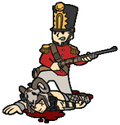|
Grand Prize Winner posted:Was destroying the Indian population an explicit policy goal after Jackson? Or did it just kind of happen as the Gringos went westward? It depends on what you mean by "explicit policy goal." "It just kind of happened" is a pretty naive way of looking at it. The stated purpose of Indian Removal under the Jackson administration, just as the name says, was to remove Indians from their present location and place them somewhere more distant where they would not be an impediment to white settlement. Of course no provision was made for keeping them alive during the journey, so the enormous death toll was what you might call a "happy accident." Usually events occurred in this way, with policy decisions that officials knew would result in mass deaths among the Native Americans, either as a consequence of their forcible removal as in the 1830s, or because they would inevitably resist and therefore be massacred by the military. Occasionally there were more explicitly stated inducements to genocide, such as when state and local governments issued bounties for scalps (California was particularly active in this regard, with standing bounties on scalps and severed heads throughout the 1850s). The genocide against Native Americans was a decentralized process that proceeded mainly from local initiative on the part of settlers, local officials, and junior officers in the military, not at the explicit direction of the federal government. The best that can be said for most of the people involved is that they didn't care how many Native Americans died in the process of stealing their land. More than likely their actions were intentionally designed to cause mass deaths, although it was often not stated openly.
|
|
|
|

|
| # ? Jun 10, 2024 03:52 |
|
If this has already been asked/replied to could you please link it? Do you know much about the Battle of Teutoburg Forest? And similarly, do you have any opinions on the Western Roman Empire not collapsing? Interested more in their use of Germanic Mercenaries v. Roman Legions prior to the collapse.
|
|
|
|
If I wanted to look for information on European (specifically English, Dutch, maaaaybe the Italy area) armies from 1580-1600 or so, what would good sources be? I'm interested in things like what they were composed of, how they were run (purchasing commissions is still weird to me), what life was like in them, what the common man would be issued, what the gentleman had to supply, all that kind of thing - as opposed to general battles and warfare and whatnot.
|
|
|
|
Dzurlord posted:If I wanted to look for information on European (specifically English, Dutch, maaaaybe the Italy area) armies from 1580-1600 or so, what would good sources be? I'm interested in things like what they were composed of, how they were run (purchasing commissions is still weird to me), what life was like in them, what the common man would be issued, what the gentleman had to supply, all that kind of thing - as opposed to general battles and warfare and whatnot. The Anglo-Spanish War straddles that time period, so you should look for sources on that.
|
|
|
|
Alchenar posted:The Anglo-Spanish War straddles that time period, so you should look for sources on that.
|
|
|
|
This was from the last page but could someone cite that slavery wanted to be expanded to poor whites? Not doubting, just want to see the evidence.
|
|
|
|
Iseeyouseemeseeyou posted:Do you know much about the Battle of Teutoburg Forest? Teutoburg was talked about on pg118 of this thread. What did you want to know about it specifically besides what happened? Are you asking if the change of composition of the Legions led to the downfall of the WRE? If so, it did not cause it on its own, but it did not really help things. The legions shifted to a more cavalry centric model in the late Empire, partly because they were fighting horsemnen, and also because they could not longer afford the number of legions required to secure the borders. Instead they had large armies of cavalry that could move quickly to respond to invasions. However the infantry definitely suffered, and it was not unfelt. The inhuman discipline of the Legions was what won the Romans their Empire, and the loss of that hurt a lot. If you had the old Legions in 400, a lot may have been different, since those battles in Gaul may have gone a lot better for the Romans. "Why the WRE fell?" is a really hard question to answer, because there is no one reason for it. Bad leadership, horrible treatment of the Goths, paying the soldiers so much they could not afford to field enough armies, constant civil war, The Huns, The Vandals, The Goths, The Sassanids, The Franks, and Josephus running around with giant joints in chariots getting all the troops high.
|
|
|
|
Is there a graph or something showing relative European power vs time? Whenever I read something or see some historical film, unless its a very famous era, I never know the context of a timeframe if say France was weak, England was thriving Spain was in slow decline, but the Dutch had a large navy etc etc.WoodrowSkillson posted:and Josephus running around with giant joints in chariots getting all the troops high. Little known fact: Roman weapons and armor were actually made of cardboard.
|
|
|
|
Dzurlord posted:If I wanted to look for information on European (specifically English, Dutch, maaaaybe the Italy area) armies from 1580-1600 or so, what would good sources be? I'm interested in things like what they were composed of, how they were run (purchasing commissions is still weird to me), what life was like in them, what the common man would be issued, what the gentleman had to supply, all that kind of thing - as opposed to general battles and warfare and whatnot. This covers a wider period than you asked for, but you may find it useful. http://www.amazon.com/Society-Renaissance-Europe-1450-1620-European/dp/0773517650/ref=pd_sim_b_4
|
|
|
|
WoodrowSkillson posted:"Why the WRE fell?" is a really hard question to answer, because there is no one reason for it. Bad leadership, horrible treatment of the Goths, paying the soldiers so much they could not afford to field enough armies, constant civil war, The Huns, The Vandals, The Goths, The Sassanids, The Franks, and Josephus running around with giant joints in chariots getting all the troops high. Few can agree on when it fell, let alone why. I think to begin to understand the answer to that question you have to understand the entire history of Rome. Hell, some historians have made arguements that the WRE is alive and well today.
|
|
|
|
Speaking of the Boshin War and a little earlier, what would have happened if Japan was like 'no gently caress you' to Perry and didn't open up to the west. Would the Imperialist powers of the time have descended on her and cut her up like sections of China?
|
|
|
|
|
ganglysumbia posted:Few can agree on when it fell, let alone why. I think to begin to understand the answer to that question you have to understand the entire history of Rome. Hell, some historians have made arguements that the WRE is alive and well today. Um how is that exactly? Is it by claiming the Church inherited enough that it survived? I know its a bit murky as to WHEN the ending was, but 476 is a pretty good spot to put it.
|
|
|
|
I think it was in this same thread that said that the Battle of Teutoberg Forest wasn't really all that significant in the long-run, and that even if the Romans hadn't been beaten in that particular instance, they eventually would have been, and then THAT other loss would have been marked by historians as the beginning of the end.
|
|
|
|
SeanBeansShako posted:Speaking of the Boshin War and a little earlier, what would have happened if Japan was like 'no gently caress you' to Perry and didn't open up to the west. In all likeliness, yes. Without modernizing there would have basically been no way that Japan could've resisted the foreign powers, and they definitely would've come knocking, at some point.
|
|
|
LimburgLimbo posted:In all likeliness, yes. Without modernizing there would have basically been no way that Japan could've resisted the foreign powers, and they definitely would've come knocking, at some point. That would make some interesting alternative history then. I take it the reason they wanted Japan to modernise as well as trade but also some sort of block to anymore expansion in the area? Kind of worked in a way if so. Until the forties.
|
|
|
|
|
SeanBeansShako posted:That would make some interesting alternative history then. I take it the reason they wanted Japan to modernise as well as trade but also some sort of block to anymore expansion in the area? I'm not sure if the US wanted Japan to modernize, per se. I think they might've been just as happy if Japan didn't, and they could just keep trading rights with them. But as was, the Japanese basically bought everything they needed to modernize from the Western powers, and the west was perfectly happy to take their money, never thinking that they'd really become a notable power. Up until the Russo-Japanese war, at least. The Japanese holding their own on land, and kicking the teeth in of the Russians at sea during the Russo-Japanese war, had pretty far reaching effects. It was basically the Japanese who broke the back of imperialist adventurism in Asia, and also disproved the darwinian belief by much of the West that Asians were incapable of holding power.
|
|
|
|
Did Japan have any major resources that the Europeans/Americans wanted or did they just want to open the place up as a market for their products? Because having major resources at that time period just about guarantees an invasion of some sort. If its the latter, then the powers got just what they wanted. Except Russia.
|
|
|
|
Rabhadh posted:Did Japan have any major resources that the Europeans/Americans wanted or did they just want to open the place up as a market for their products? Because having major resources at that time period just about guarantees an invasion of some sort. If its the latter, then the powers got just what they wanted. Except Russia. Japan is pretty resource poor, so there wasn't much that I'm aware of. When Perry first came by one of the things they were looking for was rights to whale fishing in Japanese waters, I've been told.
|
|
|
|
LimburgLimbo posted:But as was, the Japanese basically bought everything they needed to modernize from the Western powers. While I do think it's applicable in this case, using any kind of 'take-off' model to explain its rapid development is a pretty contentious issue in the historiography of modern Japan (and developmental economics in general btw). There's tons of historical examples where wholesale cooptation of modern technologies didn't work out because of a lack of specific institutional efficiencies to back it all up. That's what, IMO, makes the 1868< Japanese case an outlier. And indeed totally unexpected by the great powers of the time.
|
|
|
|
They'd been keeping up to date with western science though? Wouldn't that help them modernise after the social problems of the samuri and all that had been taken care off right?
|
|
|
|
Koesj posted:While I do think it's applicable in this case, using any kind of 'take-off' model to explain its rapid development is a pretty contentious issue in the historiography of modern Japan (and developmental economics in general btw). I wasn't really referring to a modernization theory type of take-off model. I think the Japanese basically already had the institutional background to develop, so it's not like the take-off model where the idea is just putting in the infrastructure leads to development. There were enough pretty enlightened people after the Meiji restoration that they knew what they needed to do, and they set out specifically with the intent to modernize, in order to avoid being taken over by the Western powers. But they also know that they had to modernize as quickly as possible, so they basically began straight up buying what they needed in the interim, while also hiring foreign advisors, which is what I was referring to. They also didn't neglect to begin to build their own industrial infrastructure, however, which is why by the 1900's they could make pretty much everything themselves. Edit: For example, if you'll forgive the copy and paste from wikipedia, this is what the Japanese fleet looked like during the Russo-Japanese war. 6 battleships (all British-built) 8 armored cruisers (4 British-, 2 Italian-, 1 German-built Yakumo, and 1 French-built Azuma) 9 cruisers (5 Japanese, 2 British and 2 U.S.-built) 24 destroyers (16 British- and 8 Japanese-built) 63 torpedo boats (26 German-, 10 British-, 17 French-, and 10 Japanese-built) Almost entirely bought from the western powers, presumably at considerable expense. But it turned out well for them, because as soon as they won the Russo-Japanese war, money came flooding in, because the Japanese government was then accepted as a major power (whereas before they were looked down upon as just some uppity Orientals), and all the sudden banks all over the world were willing to loan to them. LimburgLimbo fucked around with this message at 06:03 on Mar 30, 2012 |
|
|
|
R. Mute posted:Or the Eighty Years' War. You should definitely be looking at the Spanish Empire, seeing as their territories included parts of Italy and the Low Countries (though they obviously lost them during this period). WoodrowSkillson posted:
|
|
|
|
I'd appreciate it if someone could shed a bit of light on the Sassanids - in particular their ability to encroach on Byzantine lands. I've heard arguments that this was mostly due to them having an easier time logistically in the Caucasus and most anything east of the coastal Levant than the largely fleet-reliant eastern Romans, but was there anything particularly unique about their armies and organization that let them (re)expand so readily, or was it just geography coupled with a somewhat weakened and split Roman empire?
|
|
|
|
Why are the S and G numbers the way they are? Why did S1 become Personnel, S2 Intelligence, S3 Operations, etc.?
|
|
|
|
Mans posted:The reason why the old Legions didn't exist in 400 was because the classical Roman Legions consumed 70 to 80% of the Empire's resources. the empire was totally dependent of conquering new and rich land to loot, enslave and plunder to sustain it's massive well-trained army. When they reached Scotland, the Arabian and Saharan Desert and the impenetrable peoples north of the Danube and invigorated descendants of the Persians the conquests stopped and the Legions devoured themselves raw. It was simply impossible for such a well-trained army to exist in 400 A.D. It's also unfair to call the Roman armies of that time as incompetent. They had to deal with a myriad of enemies, both from outside and inside the state and they had to deal with them swiftly (both in terms of reaching their enemy fast and in terms of beating them soundly so they could move on to fight another enemy). A lot of the ridiculous spending on the troops came well after the height of the Legions' power under Trajan. As the military became the de facto government, pay kept being increased and increased to ludicrous levels. They also had a ton of recruitment issues as people from the inner empire had no interest in dying in the frozen north when their home in Carthage was quite comfortable. The earlier Empire supported far more troops on less money then the late Empire could.
|
|
|
|
WoodrowSkillson posted:Bad leadership, horrible treatment of the Goths, paying the soldiers so much they could not afford to field enough armies, constant civil war, The Huns, The Vandals, The Goths, The Sassanids, The Franks, and Josephus running around with giant joints in chariots getting all the troops high. 
|
|
|
|
Oxford Comma posted:Whoa. Didn't know the romans had photography
|
|
|
|
Anyone else get a little  listening to Mike Duncan announce the end of the History of Rome podcast? listening to Mike Duncan announce the end of the History of Rome podcast?
|
|
|
|
WoodrowSkillson posted:A lot of the ridiculous spending on the troops came well after the height of the Legions' power under Trajan. As the military became the de facto government, pay kept being increased and increased to ludicrous levels. They also had a ton of recruitment issues as people from the inner empire had no interest in dying in the frozen north when their home in Carthage was quite comfortable. The earlier Empire supported far more troops on less money then the late Empire could. And the reason why they became de facto government was because of the decentralization the army had, such a force was a disaster and there's a reason why neither parts of the empire never missed the ancient Legions and Pretorian guards. It was all about the economy basically. One side crumbled in some 200 years after the split while the other took literally more than a thousand years to fall.
|
|
|
|
They never had a very good system to replace leaders when they died, so in between the bits where they were lucky to have a few good emperors in a row, the Roman army spend rather more time fighting other Roman armies than external enemies. Although to be fair none of their enemies/neighbours were exactly parliamentary democracies or otherwise any better at it so I guess it wasn't really a "disadvantage" per se.
|
|
|
|
GreyjoyBastard posted:I'd appreciate it if someone could shed a bit of light on the Sassanids - in particular their ability to encroach on Byzantine lands. I've heard arguments that this was mostly due to them having an easier time logistically in the Caucasus and most anything east of the coastal Levant than the largely fleet-reliant eastern Romans, but was there anything particularly unique about their armies and organization that let them (re)expand so readily, or was it just geography coupled with a somewhat weakened and split Roman empire? The border between the two empires basically consisted of the Caucasus Mountains and the Syrian desert, neither of which were good country for campaigning. Most Roman-Sassanid conflicts in the area of Syria and Mesopotamia were fought over fortified border towns, which functioned as logistical depots. The nature of the terrain dictated that without controlling these sources of supply (most importantly water) it was impossible to campaign effectively. These centers would change hands during wars, but it was impossible to gather a large enough mass of troops to really force a decision in this area. The other active border in the Caucasus was also ill-suited for campaiging, for the obvious reason that it was a mountain range. For both armies the logistical difficulties were amplified by their reliance on cavalry--cavalry campaigns demand ready access to grazing, fodder, and water, which were difficult to secure in either the mountains or the desert. It was prohibitively difficult for either the Roman or Sassanid armies to deal effective damage to the other empire, because they were separated by these terrain features. The last Roman-Sassanid War was a notable exception, in which the Sassanids conquered the Levant, Egypt, and parts of Asia Minor before being pushed back by Heraclius. This had less to do with the composition of their own army and more to do with the timing of their attack, as initially the Romans were distracted with a civil war. This allowed the Sassanids to more easily take the mountainous regions of the Caucasus and Eastern Anatolia, which ordinarily would have been prohibitively difficult. Gaining control of this area eliminated it as a bottleneck, and permitted them to bypass the Syrian Desert, meaning they could finally send their full strength looping up through the Caucasus to sweep south through the Levant and Egypt. Of course Heraclius was able to rally the Roman Empire and push the Sassanids back, just in time for both sides to be totally exhausted and helpless before the Arab conquests that followed the death of Muhammad. As to the actual composition of the Roman and Sassanid armies, they were actually fairly similar. The fighting core of both armies was made up of heavy armored cavalry (the famous cataphracts), with additional light cavalry supplied by mercenary allies like the Khazars or Avars. Infantry was usually in a subordinate position, although the Roman tradition of professional soldiery carried through and the Roman infantry were much superior to their Sassanid counterparts, who were supposedly rather indifferent in quality and poorly organized.
|
|
|
|
Did they incorporate archers into sizable roles in their armies? I know the Arabs based their warfare in foot and heavy cavalry archers until the overpowered tactics of the Turks came into play. Was the same true for the empires or was the cavalry meele focused?
|
|
|
|
Mans posted:overpowered tactics of the Turks ugh someone needs to nerf those drat turks!
|
|
|
|
GreenCard78 posted:This was from the last page but could someone cite that slavery wanted to be expanded to poor whites? Not doubting, just want to see the evidence. Bah, know what he's talking about, but can't find my original college textbook on the subject that mentioned it. It wasn't quite "enslave poor whites" actually. Thing is, around this time you really have industrialization picking up in the North, which in an era before OSHA and The Jungle and all the other things suggesting maybe abusing workers wasn't such a good idea was as pretty as you can imagine. At least one Southerner writing in defense of slavery pointed to that and said the whites in question would actually be better treated as slaves. So not quite "enslave poor whites". Though poor whites didn't do much better in the Confederacy; the rich whites actually took the states into succession quite possibly against the will of the majority there. There's a (politically charged with current politics given the source, mind you, so might be better to go to the sources cited) general review of some of that stuff here if you're curious. The white worker vs. black slave thing was actually a big part of the whole dust-up about slavery in the Union to begin with. It's sad but true to note Northerners were not, as a rule, truly non-bigots wanting to free blacks from bondage; the abolitionists were vocal but not a solid majority. The real fear of slavery expansion was that slaves would be used for jobs instead of free whites because of slave labor being cheaper. So basically the cry was something like "the black slaves are gonna take your jobs in the Territories!". The Republican party actually ran on a platform of being for the working man as part of that political debate (yes, the Republicans used to be big on worker's rights; savor the irony). Then of course when the South actually left folks saw that as a death knell to the USA as a whole if allowed; the abolition stuff came in more strongly later on. So when people pull the ol' argument about secession being about slavery or not, I tend to respond "It was about slavery, but WHY it was about slavery is interesting". Anyway, sorry to tread a little far afield from military history as such, though this stuff did affect the military positions of North and South quite a bit (the article I linked goes into detail about one Southern-led "counter-secession" that gave the local government and military fits).
|
|
|
|
MadDogMike posted:
I would love to see if you can find your old college textbook and any other scholarly sources you have. About 20 pages back, I presented the same idea: The majority of white northerners were quite racist (by our current standards) and opposed black slavery on economic rather than moral grounds. I gave my home state, Indiana, as an example. Though Indiana fought on the Union side, the consitution forbade black from settling in the state. See here also (scroll down to "Black Hoosiers withstood racist laws of the 1850's"). I was shot down pretty fast by posters who cited abolitionist newspapers and popular speeches to show that most white Northerners believed in African/European equality. I still don't believe that; I don't think our modern ideas--that ethnic background has no effect on a person's intelligence or morality--just wasn't that popular 150 years ago. Unfortunately, I don't have many solid scholarly sources to back up my opinion.
|
|
|
|
It's interesting you posted that link about Southerners fighting for the Union because one of my ancestors was conscripted from the mountains of east Tennessee for the Confederacy and deserted to join the Union army, we have a copy of his discharge papers.
|
|
|
|
Bagheera posted:I would love to see if you can find your old college textbook and any other scholarly sources you have. About 20 pages back, I presented the same idea: The majority of white northerners were quite racist (by our current standards) and opposed black slavery on economic rather than moral grounds. I gave my home state, Indiana, as an example. Though Indiana fought on the Union side, the consitution forbade black from settling in the state. See here also (scroll down to "Black Hoosiers withstood racist laws of the 1850's"). If anything, the whole conception of the idea of Liberia should say just how most Northerners thought of blacks. Free maybe, but they didn't want them HERE afterwards. The Republican party did put out a lot of antislavery rhetoric, but in practice despite the fears of the South weren't really poised to wipe it out. There was a fair amount of political power struggle involved too; the South had a rather disproportionate influence in the government historically, much to the detriment of several non-slavery related the North supported like tariffs. In a lot of ways secession was the South trying to take the ball and go home because thanks to how fragmented the politics were the Republicans basically nipped in and took over because of the electoral chaos. I've read it being described as being effectively two seperate elections in the North and the South (with the Democratic party outright split North/South and the Constitutional Union party also newly formed, it was more or less a four way race, and Lincoln/Douglas dominated the North while Breckenridge/Bell fought it out in the South); Lincoln effectively won by virtue of having seventeen free states to Breckenridge's eleven slave states. He was effectively a "third party candidate" who got in because there were no strong parties to dominate an ordinarily two-party system. I gather the Repugblicans ranted about slavery since it was a "wedge issue" against the Southern oligarchy they saw as their opponent more than some deep-seated abolitionist feeling, though as the only party approaching the abolitionist position a lot of actual abolitionists joined/worked with it. Obviously things shifted as the war went on, but I read the pre-war rah-rah anti-slavery stuff from the Republicans as being a mechanism to attack enemies in the South rather than deep sentiment in a lot of them. Still can't find my textbooks; it's a pity. My undergrad school has a pretty good level of Civil War scholarship thanks to its historical ties to it (it was actually the site of one of the famous Lincoln/Douglas debates and as I understand it had part of the Underground Railroad going through town), and my class was somewhat unusual by focusing primarily on the non-military side of things and the lead-up to the war. It's amazing how much of a muddle everyone's positions actually were in the whole mess; there was a LOT of stuff going on around the armies duking it out. Mustang posted:It's interesting you posted that link about Southerners fighting for the Union because one of my ancestors was conscripted from the mountains of east Tennessee for the Confederacy and deserted to join the Union army, we have a copy of his discharge papers. Yeah, there was a LOT of that going around; they aren't kidding when they say the Civil War was often brother against brother. One of the more sad/amusing things to me was that Sherman in a lot of ways was a sympathizer to the Southern way of life; he went to the Union not because of any anti-Southern feeling so much as being unwilling to accept them breaking the US apart (see here for a nice discussion of it). So a guy who rather liked the South pre-war wound up being one of its more villified enemies by the end of it. So, you couldn't just divide people up into sides based on where they lived. MadDogMike fucked around with this message at 02:23 on Apr 4, 2012 |
|
|
|
I'm curious about when your textbooks were written and published. A lot of what you're saying they taught you about the causes of the Civil War actually comes from narratives that have fallen by the wayside over the past 20 years or so. The classic Lies my Teacher Told Me by James Loewen talks a great deal about how the history of the American Civil War and Reconstruction was radically rewritten in the first couple decades of the 20th century, during the period referred to as the "nadir of American race relations." This was the time in which the revived Ku Klux Klan became a national institution, lynchings became a fixture of American life, and Prohibition was enacted mainly on the strength of xenophobic hatred of Irish, Italian, and German immigrants. It was also a time in which the men who had fought in the Union Army and subsequently dominated national politics for decades were dying off, and the history of the Civil War was ripe to be rewritten. I could go into this but I don't think I could say it any better than Loewen, so I just recommend you pick up the book. Anyway, it was during that period that the old saw about the Civil War not really being about slavery got started, and also the legends about corrupt carpetbaggers, and the unfairness of Reconstruction, and really the whole tale of the Lost Cause of the Noble Confederacy. It's all bullshit, the war was totally about slavery. The clearest evidence of that comes the Confederates themselves, because each state government tended to justify its reasons for seceding in form of a document, like the "Declaration of Immediate Causes which May Induce and Justify the Secession of South Carolina from the Federal Union," all of these "immediate causes" are slavery-related. In hindsight attempting to destroy the United States over slavery was so obviously contemptible that the story had to be changed, so later on people decided that the conflict was really about states' rights, or economic and cultural difference between North and South, or whatever. The flip side of this was that if it wasn't about slavery for Southerners, it couldn't be about slavery for Northerners either. Hence the allegation that the Republicans were not really antislavery, just cynical opportunists who used it as their vehicle to electoral success. This is frankly false, the Republican Party emerged and grew because of the spread of antislavery sentiment throughout the North. Like this quote:In a lot of ways secession was the South trying to take the ball and go home because thanks to how fragmented the politics were the Republicans basically nipped in and took over because of the electoral chaos. At the same time, the specific reason that the Democratic Party split into Northern and Southern wings was that the Southern delegates to their national convention proposed a party plank forcing all new territories to allow slavery, irrespective of the wishes of the people who lived there. This was too much for the Northern Democrats, so the Southern faction walked out of the convention and ran separately, eventually nominating Breckenridge. This is the actual conflict over slavery that came to a head with the Civil War. From the inception of the United States, the leaders of the agrarian, slave-holding southern states had understood that the economic dynamism and rapid growth of the northern states, together with the morally indefensible institution of slavery, was a serious threat to their power within the framework of the USA. This is the reason for certain features of the Constitution, like the Three-Fifths compromise, or the item that prevented Congress from banning international trade in slaves before 1808. The Southern delegates knew that in a republican system of government they would not be able to control outcomes unless they were given special advantages. Over time, a Senate balanced between Free States and Slave States became the most important bulwark. The election of 1860 signified the beginning of the end. The Republican Platform, which won in spite of Lincoln not even appearing on the ballot in most of the South, called for slavery to be kept out of the territories. As they became states, this would unbalance the Senate, opening the prospect of further reverses, with the foreseeable end state of abolition whether the South accepted it or not. Thus the decision to secede.
|
|
|
|
How and how effective were submarine wolf-packs implemented by the US Navy? I read Ed Offley's Turning the Tide, which is a fantastic book about wolf-packs vs. convoys in the North Atlantic, so I have a pretty good understanding of how Admiral Donitz/BdU organized theirs*, so I'm wondering what it was like in the Pacific. All I know is that they also used it, but not how they worked - it seems almost like an afterthought. * U-boats would be grouped together in packs of 15-30 boats, then strung out in a picket line along known or predicted convoy routes, maybe 10 miles apart. Once a single U-boat made contact, it would NOT attack right away, but rather shadow the convoy while everyone else was vectored onto the victim. As soon as at least two subs were in contact, the others could go in, whether that meant a night-time surface attack, racing ahead and waiting for the convoy to sail into their path, or a direct approach and attack.
|
|
|
|

|
| # ? Jun 10, 2024 03:52 |
|
gradenko_2000 posted:How and how effective were submarine wolf-packs implemented by the US Navy? My knowledge is limited, but I recall Admiral Momsen was involved in the development. They were called "coordinated attack groups." I believe the American method was more rigid, in that three boats were expected to transit together, approach independently, and attack in coordination (one boat would initiate, then fall back as 'trailer,' while the two 'flankers' hit the convoy simultaneously - theoretically). The difficulties are obvious. One success story that used this specific method (that I know of) involved Shark, Pintado, and Pilotfish (all Balaos) off the Marianas - they made a series of tag-team attacks on a reinforcement convoy heading to Saipan and sunk much of it. I know there were 'flights' of submarines that slipped past the minefields into the Sea of Japan late in the war, and acted as discrete tactical units. There's even a lovely Reagan movie about it! (Hellcats of the Navy - not about fighters, oddly)
|
|
|























